Corn tortillas aren't strictly low-carb, but they're a smarter choice than flour tortillas if you're watching your carb intake. A 6-inch corn tortilla contains about 10.7 grams of carbs, with 1.5 grams of fiber. They have a lower glycemic index (52) compared to flour tortillas (70), which means they're less likely to spike your blood sugar. While not ideal for very low-carb diets, corn tortillas can fit into a balanced eating plan when consumed in moderation. To reduce carbs further, consider alternatives like lettuce wraps or cauliflower tortillas. Understanding portion sizes and exploring low-carb options can help you enjoy Mexican cuisine while managing your carbohydrate consumption.
Key Takeaways
- Corn tortillas have fewer carbs than flour tortillas but are not considered low-carb.
- A 6-inch corn tortilla contains about 10.7 grams of carbohydrates.
- The fiber content in corn tortillas slightly reduces their net carb count.
- Corn tortillas have a lower glycemic index (52) compared to flour tortillas (around 70).
- For those on low-carb diets, alternatives like cauliflower or lettuce wraps are better options.
Nutritional Profile of Corn Tortillas
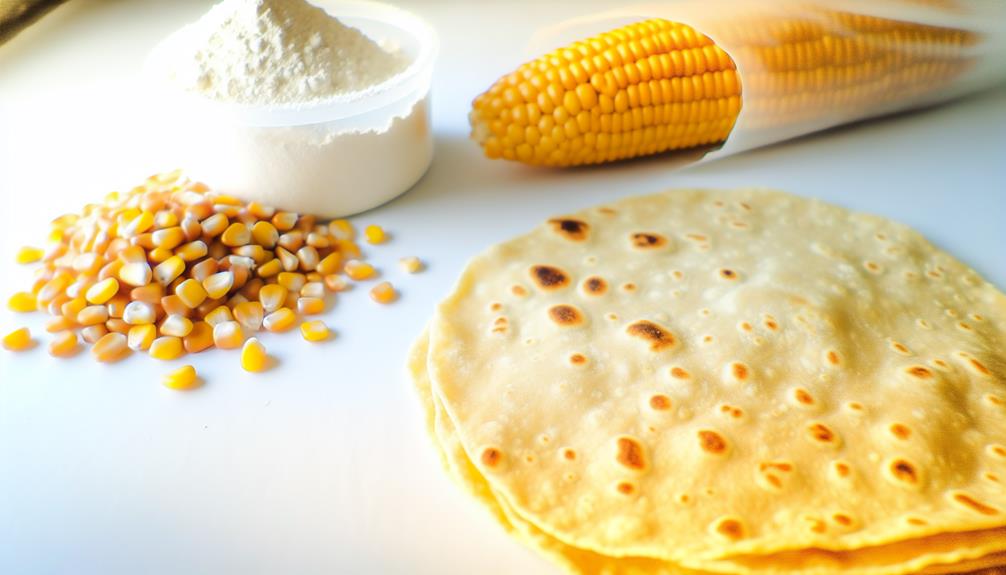
Corn tortillas pack a nutritional punch with four key components: carbohydrates, protein, fiber, and essential minerals. When you're looking for a nutritional comparison, you'll find that corn tortillas generally contain fewer calories and carbs than their flour counterparts. A typical 6-inch corn tortilla provides about 52 calories and 10.7 grams of carbohydrates.
The fiber content in corn tortillas is noteworthy, with each tortilla offering around 1.5 grams of dietary fiber. This can contribute to your daily fiber intake, which is crucial for digestive health and maintaining a feeling of fullness. If you're focused on weight loss, corn tortillas can be a smart choice due to their lower calorie content and higher fiber compared to flour tortillas.
However, portion sizes are key. While corn tortillas can fit into a balanced diet, consuming them in moderation is important. They're still a source of carbs, so if you're following a low-carb diet, you'll need to be mindful of your intake.
Carb Content Breakdown
When examining corn tortillas' carb content, you'll find it's essential to distinguish between net carbs and total carbs. Net carbs, which subtract fiber from total carbs, can vary significantly among different brands of corn tortillas.
You'll notice that while most corn tortillas contain similar total carb amounts, their fiber content can differ, affecting the net carb count you'll need to consider for dietary planning.
Net Carbs Vs. Total
Understanding the difference between net carbs and total carbs is crucial when evaluating the carbohydrate content of corn tortillas. Net carbs are calculated by subtracting fiber and certain sugar alcohols from the total carb count. This calculation is important for those following low-carb diets or managing blood sugar levels.
When looking at corn tortillas, you'll notice that their fiber content impacts the net carb calculation. Here's a breakdown of the carb content in a typical 6-inch corn tortilla:
| Nutrient | Amount (g) | % of Total Carbs |
|---|---|---|
| Total Carbs | 13 | 100% |
| Fiber | 2 | 15% |
| Net Carbs | 11 | 85% |
As you can see, the fiber content reduces the net carbs slightly. When examining carb content labeling on packaged corn tortillas, you'll often find total carbs listed prominently. However, for a more accurate assessment of their impact on your diet, it's essential to calculate the net carbs.
Comparing Different Brands
You'll find significant variations in carb content across different brands of corn tortillas, making it essential to compare nutritional labels carefully. When examining different brands, consider these factors:
- Total carbohydrates per serving
- Fiber content, which affects net carbs
- Serving size, as it may differ between brands
- Ingredients list, looking for added sugars or fillers
While comparing carb content, don't forget to consider taste comparison and texture analysis. Some lower-carb options might sacrifice flavor or have a different mouthfeel than traditional corn tortillas. Price differences and availability check are also important factors to consider when choosing a brand.
Popular brands like Mission, La Banderita, and Guerrero offer corn tortillas with varying carb contents. For example, Mission's extra thin corn tortillas contain 11g of total carbs per serving, while their regular corn tortillas have 23g. La Banderita's carb counter corn tortillas boast only 5g of net carbs per serving.
Corn Vs. Flour Tortillas
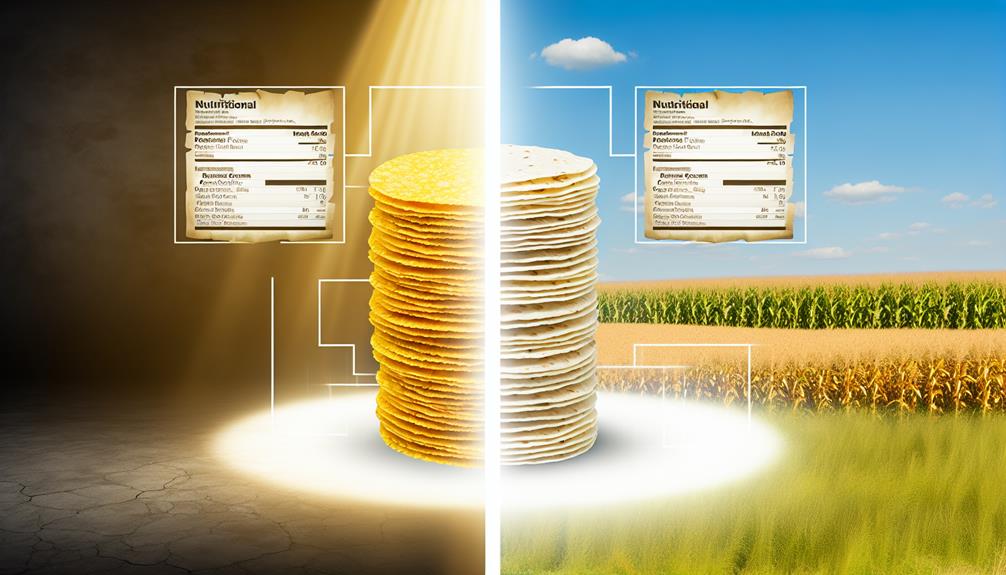
Corn and flour tortillas differ significantly in their carbohydrate content and nutritional profiles. When you're comparing these two staples, you'll find that corn tortillas generally have fewer carbs and calories. A typical 6-inch corn tortilla contains about 13 grams of carbs, while a similar-sized flour tortilla has around 20 grams.
Your taste preference and cooking methods may influence your choice. Corn tortillas have a distinct, earthy flavor and work well for traditional dishes like tacos and enchiladas. They're also gluten-free, making them a great option for those with celiac disease or gluten sensitivity.
Flour tortillas, on the other hand, are more pliable and often preferred for burritos and quesadillas. Consider the cultural significance and environmental impact of your choice. Corn tortillas have deep roots in Mesoamerican cuisine and are often seen as more authentic.
They're also more sustainable, as corn production generally has a lower environmental footprint than wheat. By choosing corn tortillas, you're not only making a healthier choice but also connecting with a rich culinary tradition and supporting more eco-friendly farming practices.
Glycemic Index Comparison
When comparing the glycemic index of corn and flour tortillas, you'll find that corn tortillas generally have a lower GI score, making them a better choice for blood sugar management. This difference in glycemic index can have significant implications for your health, especially if you're watching your blood sugar levels or trying to manage your weight.
The glycemic index comparison between corn and flour tortillas reveals:
- Corn tortillas typically have a GI score of 52, while flour tortillas score around 70
- Lower GI foods like corn tortillas cause a slower, more gradual rise in blood sugar
- The slower blood sugar response can help you feel fuller for longer periods
- Choosing lower GI options may contribute to better weight management over time
Low-Carb Alternatives to Consider
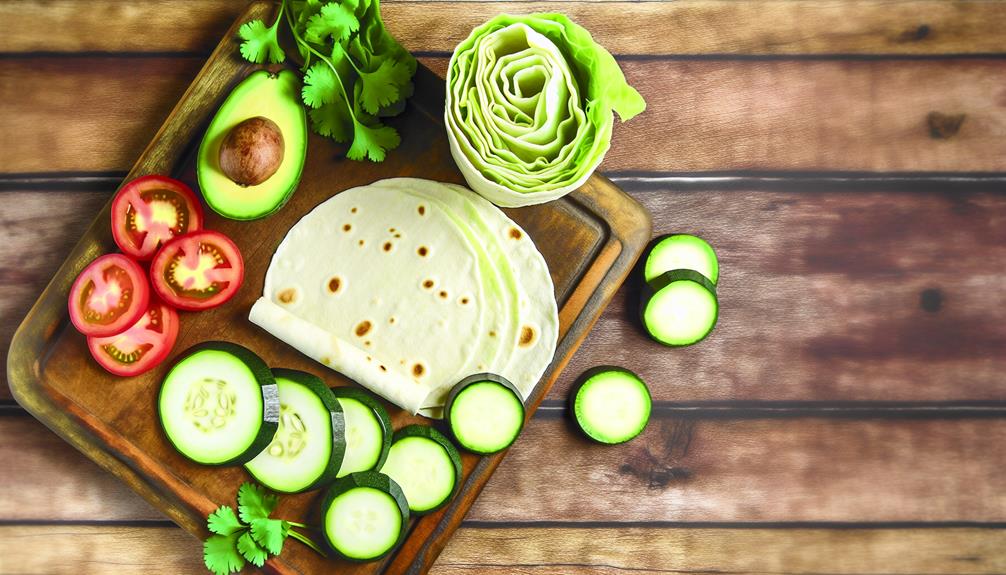
If you're looking to reduce your carbohydrate intake, several low-carb alternatives to corn tortillas are available.
You can try cauliflower tortilla wraps, which offer a vegetable-based option with significantly fewer carbs than traditional corn tortillas.
Other options include lettuce leaf wraps for a crisp, fresh alternative, or almond flour tortillas that provide a nutty flavor while keeping carbohydrates low.
Cauliflower Tortilla Wraps
For those seeking a low-carb alternative to traditional corn tortillas, cauliflower tortilla wraps have gained popularity as a nutritious substitute. These wraps are made from cauliflower crust, offering a veggie-based option that's lower in carbohydrates and higher in fiber. You'll find they're versatile enough to hold your favorite taco meat or chicken filling, while providing a satisfying crunch.
When incorporating cauliflower tortilla wraps into your diet, consider these benefits:
- Lower carb content: Typically containing 5-7g of carbs per wrap, compared to 15-20g in corn tortillas.
- Higher fiber: Cauliflower provides more dietary fiber, aiding digestion and promoting fullness.
- Additional nutrients: Rich in vitamins C and K, as well as antioxidants.
- Gluten-free option: Suitable for those with gluten sensitivities or celiac disease.
You can enhance your cauliflower wrap experience by pairing it with avocado salsa or other low-carb toppings. Remember, while these wraps offer a nutritious alternative, they may have a different texture and taste compared to traditional corn tortillas. Experiment with recipes and toppings to find your perfect low-carb wrap combination.
Lettuce Leaf Wraps
Lettuce leaf wraps offer an ultra-low-carb alternative to corn tortillas, providing a crisp and refreshing vessel for your favorite taco fillings. When you're looking to reduce your carb intake, these versatile wraps can be a game-changer for your meal planning.
Lettuce wraps typically contain less than 1 gram of carbohydrates per leaf, making them an excellent choice for those following low-carb or ketogenic diets. You'll find that lettuce wraps work well with a variety of protein fillings, such as grilled chicken, seasoned ground beef, or sautéed shrimp. They're not only low in carbs but also rich in vitamins A and K, folate, and water content, supporting your overall nutrition goals.
By choosing lettuce wraps, you're joining a community of health-conscious individuals who prioritize nutrient-dense foods. To create sturdy wraps, opt for large, leafy varieties like romaine, butter lettuce, or iceberg. These types provide the structure needed to hold your fillings without falling apart.
Almond Flour Tortillas
Almond flour tortillas offer a low-carb alternative to traditional corn tortillas, typically containing around 2-3 grams of net carbs per serving. These tortillas are made primarily from ground almonds, providing a nutty flavor and a soft, pliable texture. They're an excellent option for those following a low-carb or keto diet, as they're high in healthy fats and protein while being low in carbohydrates.
When it comes to baking techniques and flavor profiles, you'll find that almond flour tortillas are versatile and easy to work with. Here are four key points to consider:
- They're best cooked on medium-low heat to prevent burning
- Adding spices like cumin or garlic powder can enhance their flavor
- Brushing with oil before cooking can improve texture and taste
- Storing in an airtight container helps maintain freshness
For filling options and meal prep ideas, you can use almond flour tortillas just like traditional ones. They're great for wraps, tacos, quesadillas, or even as a base for low-carb pizzas. Prep a batch in advance, and you'll have a convenient, low-carb option ready for quick meals throughout the week.
Portion Control Strategies
Controlling your portion size is crucial when incorporating corn tortillas into a balanced diet. Practicing mindful eating can help you enjoy these traditional staples without overindulging. Start by using smaller plates to create the illusion of a fuller meal.
A standard serving of corn tortillas is typically one or two 6-inch tortillas, which can fit nicely on a salad plate.
When planning your meals, think of corn tortillas as a complement to your proteins and vegetables, not the main focus. Fill your tortillas with nutrient-dense ingredients like lean meats, beans, and plenty of vegetables to create balanced meals.
For healthy snacking, consider cutting a single tortilla into wedges and baking them for homemade chips, paired with salsa or guacamole.
To maintain portion control, pre-portion your tortillas for the week. Store them in individual servings in reusable containers or bags. This strategy prevents mindless eating and helps you stick to your nutritional goals.
Incorporating Corn Tortillas Wisely
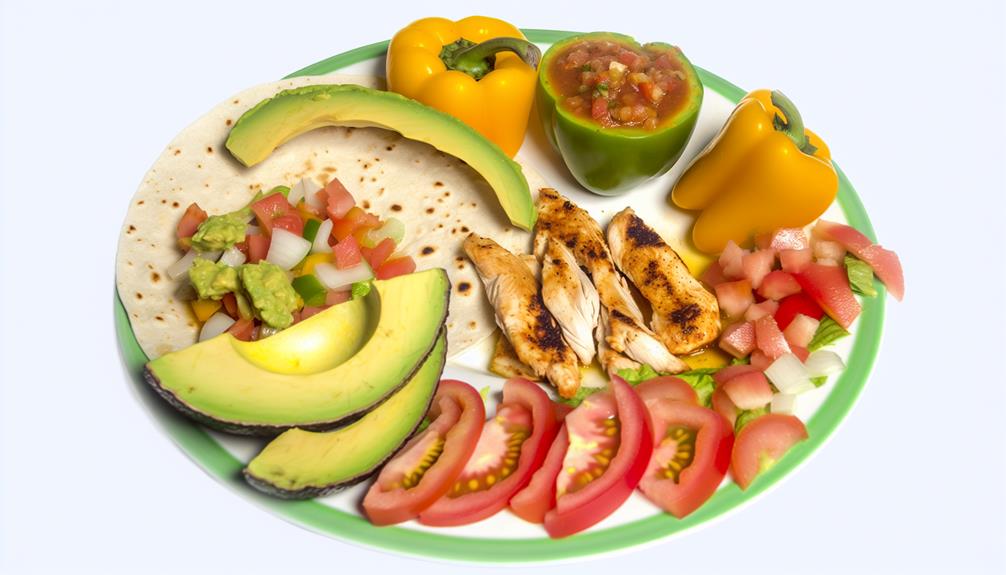
To incorporate corn tortillas wisely into your diet, you'll need to balance portion control with smart food pairings. Consider serving your tortillas with low-carb options like grilled vegetables, lean proteins, or salsa to reduce the overall carbohydrate content of your meal.
When you're aiming for a lower-carb day, you can explore alternatives such as lettuce wraps or cauliflower tortillas to satisfy your craving without the extra carbs.
Portion Control Strategies
Effective portion control is key when incorporating corn tortillas into your diet, as it helps manage carbohydrate intake while still enjoying this versatile staple. Mindful eating plays a crucial role in portion control, allowing you to savor each bite while staying aware of your consumption.
To practice portion control with corn tortillas, consider these strategies:
- Use smaller plates: This visual trick can help you feel satisfied with fewer tortillas.
- Measure your tortillas: One serving is typically 1-2 small (6-inch) tortillas.
- Fill tortillas with protein and vegetables: This balanced approach helps you feel fuller with fewer carbs.
- Pre-portion tortillas for meals: Divide packages into serving sizes to avoid overeating.
Pairing With Low-Carb Foods
Balancing your corn tortilla intake with low-carb foods can help you maintain a nutritious diet while still enjoying this staple grain product. To make the most of your corn tortillas, consider pairing them with low-carb snacks and creative pairings. For example, fill your tortillas with lean proteins like grilled chicken or fish, which are excellent sources of nutrients without adding extra carbs. Add plenty of non-starchy vegetables such as lettuce, tomatoes, and bell peppers to increase fiber and volume without significantly impacting carb content.
When it comes to low-carb meal prep, corn tortillas offer easy options for quick and satisfying meals. Prepare a batch of seasoned ground turkey or beef, and store it alongside pre-cut vegetables for quick taco assembly. You can also use corn tortillas as a base for low-carb pizza alternatives by topping them with sugar-free tomato sauce, cheese, and vegetables.
Alternatives for High-Carb Meals
Corn tortillas' versatility allows you to create satisfying alternatives to traditionally high-carb meals while still enjoying their unique flavor and texture. By incorporating them wisely, you can maintain a balanced diet without feeling deprived.
Here are four ways to use corn tortillas as alternatives in high-carb meals:
- Taco bowls: Replace rice with shredded lettuce or cauliflower rice, then top with a small, crispy corn tortilla for crunch.
- Enchilada casserole: Layer corn tortillas with lean protein, vegetables, and low-fat cheese for a lighter version of this comfort food.
- Breakfast burrito swap: Use a single corn tortilla instead of a large flour tortilla, filling it with eggs and veggies.
- Quesadilla makeover: Stuff a corn tortilla with grilled vegetables and a sprinkle of cheese for a lighter snack.
Pair these corn tortilla alternatives with veggie noodles or quinoa salads to further reduce overall carb intake. By making these smart substitutions, you'll enjoy familiar flavors while aligning with your nutritional goals.
Health Benefits of Corn Tortillas
While often overlooked, corn tortillas offer several health benefits that make them a nutritious choice for your diet. The health benefits of corn tortilla consumption extend beyond their traditional role in Mexican cuisine. These wholesome wraps are packed with essential nutrients that can support your overall well-being.
One of the key advantages of corn tortillas is their relatively low carb content compared to wheat-based alternatives. This makes them an excellent option for those focused on weight management or maintaining stable blood sugar levels. By incorporating corn tortillas into your meals, you're choosing a food that can help you feel satisfied without overloading on carbohydrates.
Additionally, corn tortillas are naturally gluten-free, making them a safe choice for those with celiac disease or gluten sensitivity. They're also rich in fiber, which aids digestion and promotes feelings of fullness. The presence of whole grain corn in these tortillas provides important vitamins and minerals, including B vitamins, iron, and magnesium.
Recipes for Low-Carb Mexican Dishes
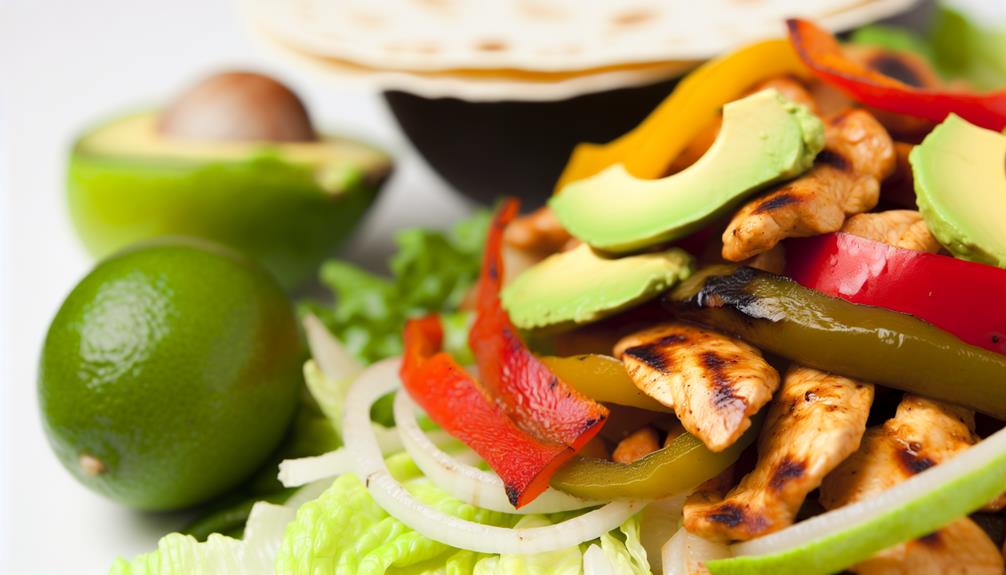
To satisfy your craving for Mexican cuisine without derailing your low-carb diet, you'll find a wealth of delicious recipes that substitute traditional high-carb ingredients with healthier alternatives. Low-carb taco and fajita recipes often replace corn tortillas with lettuce wraps or low-carb tortillas made from almond or coconut flour. These substitutions significantly reduce the carbohydrate content while maintaining the authentic flavors you love.
For keto-friendly enchiladas and quesadillas, consider these low-carb adaptations:
- Use thinly sliced zucchini or eggplant as a tortilla replacement
- Opt for a cheese-based 'shell' by melting and shaping cheese into a pliable wrap
- Create a cauliflower-based tortilla for a vegetable-rich alternative
- Experiment with egg-based wraps for a protein-packed option
Making Informed Dietary Choices
When making dietary choices, it's crucial to understand the nutritional content of your food, especially when it comes to carbohydrates in staples like corn tortillas. If you're following a low-carb diet or managing diabetes, carb counting becomes essential. A typical 6-inch corn tortilla contains about 12-15 grams of carbs, which mightn't fit into your daily carb allowance if you're aiming for strict carb restriction.
However, you don't have to give up on your favorite Mexican dishes entirely. There are several low carb swaps you can consider. For instance, lettuce wraps or cabbage leaves can replace tortillas in many recipes.
Alternatively, you can opt for smaller tortillas or limit yourself to one instead of multiple servings. Some brands also offer low-carb tortilla options made with alternative flours.
Conclusion
You've learned that corn tortillas aren't low-carb, but they're still a better choice than flour tortillas. While they offer nutritional benefits, you'll need to balance their carb content with your dietary goals.
Consider portion control or low-carb alternatives if you're watching your carb intake.
Remember, making informed choices doesn't mean completely eliminating foods you enjoy. Instead, focus on incorporating corn tortillas wisely into a balanced, nutrient-rich diet that aligns with your health objectives.
Leave a Reply